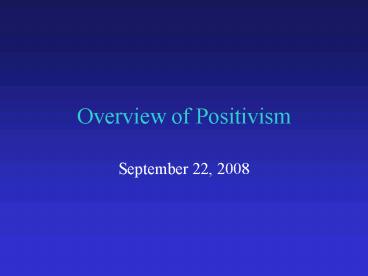Overview of Positivism - PowerPoint PPT Presentation
1 / 18
Title:
Overview of Positivism
Description:
Logic is the Tool for Understanding Science ... (II) Are they about some hidden part of the world? Scientific Realism vs. Scientific Antirealism ... – PowerPoint PPT presentation
Number of Views:90
Avg rating:3.0/5.0
Title: Overview of Positivism
1
Overview of Positivism
- September 22, 2008
2
Positivism Main Points
- Roots in Empiricism
- Inspired by Scientific Advances
- Claims about Language
- Analytic/Synthetic Distinction
- Verifiability Theory of Meaning
- In Principle/In Practice
- Strong vs. Weak Verifiability
- Observation?
3
Positivism Views of Science
- Distinction Observational Language vs.
Theoretical Language - Science Aims for Prediction
- Logic is the Tool for Understanding Science
- Distinction Context of Discovery vs. Context of
Justification - Philosophical Analysis is Possible without
Empirical Assumptions.
4
Observational Language vs. Theoretical Language
- Two-step Process
- Observation sentences are given in experience.
- Observation sentences are then related to the
theoretical sentences.
5
(No Transcript)
6
There are photons. Photons have wave-like
properties. The photon emitter is switched
on. There are two slits in the wall. There are
light and dark bands on the screen.
7
It looks like I have hands.
8
There is an external world. I am not a brain in
a vat. (etc.) It looks like I have hands.
9
Positivism Views of Science
- Distinction Observational Language vs.
Theoretical Language - Science Aims for Prediction
- Logic is the Tool for Understanding Science
- Distinction Context of Discovery vs. Context of
Justification - Philosophical Analysis is Possible without
Empirical Assumptions.
10
Positivism Views of Science
- Distinction Observational Language vs.
Theoretical Language - Science Aims for Prediction
- Logic is the Tool for Understanding Science
- Distinction Context of Discovery vs. Context of
Justification - Philosophical Analysis is Possible without
Empirical Assumptions.
11
Understand Science with Logic
- Deductive Logic
- The study of logical implication.
- E.g., what sentences, when true, necessitate the
truth of what other sentences? - Inductive Logic
- The study of logical relations between sets of
sentences, when the neither set logically implies
the other. - Deductive logic may be regarded as the theory of
the relation of logical consequence, and
inductive logic as the theory of another concept
c which is likewise objective and logical,
viz., degree of confirmation. Rudolf Carnap
12
Understand Science with Logic
- Doubts about Inductive Logic Could it be
objective? - Note about Bayesianism (see Ch 14)
13
Positivism Views of Science
- Distinction Observational Language vs.
Theoretical Language - Science Aims for Prediction
- Logic is the Tool for Understanding Science
- Distinction Context of Discovery vs. Context of
Justification - Philosophical Analysis is Possible without
Empirical Assumptions.
14
Discovery vs. Justification
- Context of Discovery how scientists go about
doing science. - Context of Justification what justifies the
theories that scientists come up with.
15
Positivism Views of Science
- Distinction Observational Language vs.
Theoretical Language - Science Aims for Prediction
- Logic is the Tool for Understanding Science
- Distinction Context of Discovery vs. Context of
Justification - Philosophical Analysis is Possible without
Empirical Assumptions.
16
POSITIVISMS MAIN CLAIM
- Philosophy of science aims to come up with a
logic of how past observation can lead to
prediction of future observation. This will give
us a philosophical picture of science.
Schlick what every scientist seeks, and seeks
alone, arethe rules which govern the connection
of experiences, and by which alone they can be
predicted.
17
Positivism Views of Science
- Distinction Observational Language vs.
Theoretical Language - Science Aims for Prediction
- Logic is the Tool for Understanding Science
- Distinction Context of Discovery vs. Context of
Justification - Philosophical Analysis is Possible without
Empirical Assumptions. - Scientific inference is just like everyday
inference.
18
Later Logical Empiricism
- Maintain Observational/Theoretical Distinction
- Dilemma (I) Are the theoretical parts of
science long-winded ways of talking about
observation sentences, or (II) Are they about
some hidden part of the world? - Scientific Realism vs. Scientific Antirealism































